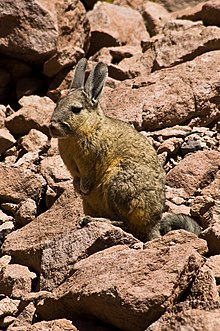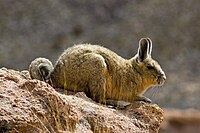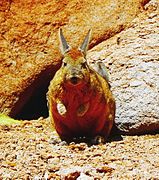Viscacha
Appearance
| Viscacha | |
|---|---|

| |
| A southern viscacha in the Atacama desert, Chile | |
| Scientific classification | |
| Domain: | Eukaryota |
| Kingdom: | Animalia |
| Phylum: | Chordata |
| Class: | Mammalia |
| Order: | Rodentia |
| Superfamily: | Chinchilloidea |
| Family: | Chinchillidae |
| Groups included | |
| |
| Cladistically included but traditionally excluded taxa | |
Viscacha or vizcacha (UK: /vɪˈskætʃə/, US: /vɪˈskɑːtʃə/) are rodents of two genera (Lagidium and Lagostomus) in the family Chinchillidae. They are native to South America and look similar to rabbits due to convergent evolution, not relatedness.[1]
The five extant species of viscacha are:
- The plains viscacha (Lagostomus maximus), a resident of the Pampas of Argentina, is easily differentiated from other viscachas by black and gray mustache-like facial markings. This species lives colonially in warrens of 10 to over 100. It is very vocal and emits alarm calls. The plains viscacha can strip grassland used to graze livestock; this has caused ranchers to consider the rodent a pest species.
- Lagidium ahuacaense is a newly described species of mountain viscacha from the Ecuadorian Andes.[2]
- The northern viscacha (Lagidium peruanum) is native to the Peruvian Andes at elevations between the tree line and the snow line. It is dorsally gray or brown in color, with a bushy tail and long, furry ears. This species lives in large colonies separated into individual family units, like an apartment complex. It eats a wide range of plant matter, settling for almost anything it can find growing in the harsh, rocky environment.[3]
- The southern viscacha (Lagidium viscacia), also called mountain viscacha, is similar to the northern viscacha, but its pelage is more red in color. It lives in similar habitat in the Andes.[3]
- Wolffsohn's viscacha (Lagidium wolffsohni) is rarer than the other four species.
-
A southern viscacha in the Sur Lipez desert, Bolivia
-
Viscacha near Salar De Uyuni, 2017
-
A viscacha warms itself in the morning sun in the Andes mountains in Chile.
In popular culture
The appearance of the character Nanachi from the hit manga series, Made in Abyss, is based on the viscacha.
References
- ^ Nosowitz, Dan. "Mystery Animal Contest: Who Is This Fuzzy Sniffler?". Popsci. Popular Science. Retrieved 15 April 2018.
- ^ Ledesma, K. J.; Werner, F. A.; Spotorno, A. E.; Albuja, L. H. (2009). "A new species of Mountain Viscacha (Chinchillidae: Lagidium Meyen) from the Ecuadorian Andes" (PDF). Zootaxa. 2126: 41–57. doi:10.11646/zootaxa.2126.1.2.
- ^ a b Werner, F. A.; Ledesma, K. J. R.; Hidalgo, B. (2006). "Mountain vizcacha (Lagidium cf. peruanum) in Ecuador - First record of Chinchillidae from the Northern Andes" (PDF). Mastozoología Neotropical. 13 (2): 271–274.
External links
Wikimedia Commons has media related to viscacias.
- Lydekker, Richard (1911). . Encyclopædia Britannica (11th ed.).



